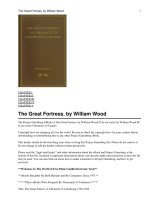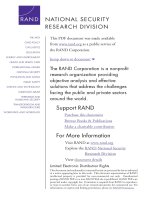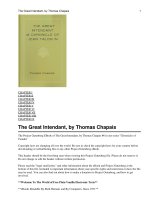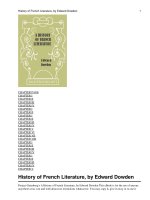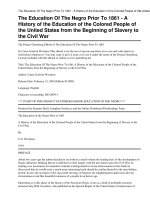The great democracies a history of the english speaking peoples, volume iv
Bạn đang xem bản rút gọn của tài liệu. Xem và tải ngay bản đầy đủ của tài liệu tại đây (809.13 KB, 96 trang )
Tai Lieu Chat Luong
TableofContents
TitlePage
CopyrightPage
Acknowledgements
Introduction
PREFACE
BOOKI-RECOVERYANDREFORM
CHAPTERONE-THEVICTORYPEACE
CHAPTERTWO-CANNINGANDTHEDUKE
CHAPTERTHREE-REFORMANDFREETRADE
CHAPTERFOUR-THECRIMEANWAR
CHAPTERFIVE-PALMERSTON
CHAPTERSIX-THEMIGRATIONOFTHEPEOPLES
CHAPTERSEVEN-THEMIGRATIONOFTHEPEOPLES
BOOKII-THEGREATREPUBLIC
CHAPTEREIGHT-AMERICANEPIC
CHAPTERNINE-SLAVERYANDSECESSION
CHAPTERTEN-THEUNIONINDANGER
CHAPTERELEVEN-THECAMPAIGNAGAINSTRICHMOND
CHAPTERTWELVE-LEEANDMCCLELLAN
CHAPTERTHIRTEEN-CHANCELLORSVILLEANDGETTYSBURG
CHAPTERFOURTEEN-THEVICTORYOFTHEUNION
BOOKIII-THEVICTORIANAGE
CHAPTERFIFTEEN-THERISEOFGERMANY
CHAPTERSIXTEEN-GLADSTONEANDDISRAELI
CHAPTERSEVENTEEN-AMERICAN“RECONSTRUCTION”
CHAPTEREIGHTEEN-AMERICAASAWORLDPOWER
CHAPTERNINETEEN-HOMERULEFORIRELAND
CHAPTERTWENTY-LORDSALISBURY’SGOVERNMENTS
CHAPTERTWENTY-ONE-THESOUTHAFRICANWAR
ENDNOTES
INDEX
SUGGESTEDREADING
Copyright©1958byTheRightHonourableSirWinstonChurchill,
K.G.O.M.C.H.M.P.
ThiseditionpublishedbyBarnes&Noble,Inc.,byarrangementwith
Dodd,Mead&Company,Inc.
IntroductionandSuggestedReading©2005
byBarnes&Noble,Inc.
This2005editionpublishedbyBarnes&Noble,Inc.
Allrightsreserved.Nopartofthispublicationmaybereproduced,stored
inaretrievalsystem,ortransmitted,inanyformorbyany
means,electronic,mechanical,photocopying,recording,or
otherwise,withoutpriorwrittenpermissionfromthepublisher.
MapsbyJamesMacdonald
ISBN-13:978-0-7607-6860-0
ISBN-10:0-7607-6860-9
eISBN:978-1-41142878-2
PrintedandboundintheUnitedStatesofAmerica
3579108642
ACKNOWLEDGMENTS
IDESIRETORECORDMYTHANKSAGAINTOMRF.W.DEAKINAND
Mr G. M. Young for their assistance before the Second World War in the
preparation of this work; to Professor Asa Briggs of Leeds University, to Mr
Maldwyn A. Jones of Manchester University, and to Mr Maurice Shock of
UniversityCollege,Oxford,whohavesincehelpedinitscompletion;andtoMr
Alan Hodge, Mr Denis Kelly, Mr Anthony Montague Browne and Mr C. C.
Wood.Ihavealsotothankmanyotherswhohavekindlyreadthesepagesand
commenteduponthem.
ForpermissiontoincludeaquotationfromTheOxfordHistoryoftheUnited
StatesacknowledgmentisduetotheOxfordUniversityPress.
INTRODUCTION
THE GREAT DEMOCRACIES, THE FOURTH VOLUME OF WINSTON
Churchill’s A History of the English-Speaking Peoples, was the last volume in
hislongliterarycareer.Thisfactbyitself,however,wouldmakeitunworthyof
study. What makes it valuable is that it serves as a distillation of Churchill’s
politicalthinkingandvision,especiallyinregardstohisbeliefthatthereexisted
fundamentalties,culturalandpolitical,amongtheEnglish-speakingpeoples.As
aworkofhistory,thisvolumecoverstheperiodfromtheendoftheNapoleonic
Warsin1815totheendoftheSouthAfricanorBoerWarin1902,andexplores
thedevelopmentofsixEnglish-speakingsocieties:GreatBritain,Australia,New
Zealand, Canada, South Africa, and the United States as they advance towards
democracy. Churchill’s emphasis, however, is on Great Britain and the United
States as central to progress and freedom in the world and the essential unity
between the two societies. Readers aware of the current “special relationship”
betweenGreatBritainandtheUnitedStateswillfindinChurchill’streatmentof
nineteenth-century Anglo-American history the origins of this relationship.
Moreover, reading this volume will also introduce to readers aspects of
Churchillianphilosophythatguidedhisactionsasaparticipantinworldaffairs.
Two, in particular, should be stressed at the outset. First, Churchill had a
concretephilosophyofhistoricalchange:Hebelievedintheinexorableprogress
of mankind and that this progress was best guided by peaceable change and
reform in society rather than by violent revolution. Second, underscoring
Churchill’sromantictemperamentasamanattractedbyactionandadventure,he
believedintheactiveroleplayedby“greatmen”inwhichtheoutcomeofevents
is determined by the heroism and courage of individuals. Finally, readers will
see narrative and philosophy are presented in The Great Democracies through
Churchill’s considerable writing skill. This skill included allusiveness, subtle
insightintohumancharacter,abrisknessinpace,ashrewduseofanalogyand
simile,andanabilitytobevividandtostimulatethereader.
Winston Churchill (1874-1965) is best remembered as one of the leading
political figures of the twentieth century. Through a long political career that
extended from 1900 to 1964, he achieved high-level positions in the British
Cabinet, including serving as First Lord of the Admiralty during both World
Wars as well as Chancellor of the Exchequer (a rough equivalent to the
American position Secretary of the Treasury) from 1924 to 1929. Of course,
ChurchillreachedhisgreatestfameasPrimeMinisterontwoseparateoccasions,
most memorablyduringtheSecond World Warwhen hisindomitablewill and
“bulldog” personality seemed to personify the British people’s will to survive
andtriumphovertheNazithreat.ButChurchillalsobelongedtoaselectgroup
of individuals, twentieth-century writer-politicians like: Theodore Roosevelt,
Woodrow Wilson, Jawaharlal Nehru, Vladimir Lenin, Leon Trotsky, and
CharlesDeGaulle—politicalfigureswhocouldalsoberegardedasdistinguished
for their literary gifts. In Churchill’s case, the full recognition of his literary
skills came when he was awarded the Nobel Prize for Literature in 1953. His
body of literature included journalism (London to Ladysmith, via Pretoria
[1900], Ian Hamilton’s March [1900]), essays about contemporaries (Great
Contemporaries[1937]), memoirs (TheWorld Crisisand theAftermath [192331], My Early Life [1930], The Second World War [1948-54 ]), biographies
(LordRandolphChurchill[1906],Marlborough:HisLifeandTimes[1933-38]),
aswellasAHistoryoftheEnglish-SpeakingPeoples.Thislastwaspublishedin
two installments in 1957-58 with the fourth volume, The Great Democracies,
published in the latter year, and had as its primary purpose the objective of
remindingreadersofthecommonheritagethatconnectedpeoplesoftheBritish
Isles with the English-speaking peoples living in the Commonwealth, South
Africa,ortheUnitedStates.Churchill,himself,washalf-American.Hismother,
Jennie Jerome, was the daughter of Leonard Jerome, a prominent New York
financier,sportsman,andnewspaperproprietor(hewaspart-ownerofTheNew
YorkTimes).ThisAmericanheritagehelpstoexplainChurchill’skeeninterestin
AmericanhistoryandtheemphasisgiventoitinTheGreatDemocracieswith
its especially detailed account of the American Civil War. Churchill famously
statedtotheU.S.CongressinDecember1941,“Icannothelpreflectingthatif
myfatherhadbeenAmericanandmymotherBritish,insteadoftheotherway
round, I might have got here on my own,” suggesting that he personified the
shared heritage of the British and Americans. The Americans certainly
recognizedChurchill’stiestotheUnitedStateswhentheygrantedhimhonorary
citizenshipin1963.
Asayoungman,WinstonChurchillwasmuchinfluencedbythetitansofthe
eighteenth-andnineteenth-centuryBritishhistoricalprofession:EdwardGibbon
andThomasMacaulay.Churchillborrowedthestatelyandoracularwritingstyle
of Gibbon, the author of the multi-volume eighteenth-century masterpiece
DeclineandFalloftheRomanEmpire.Inaddition,Gibbon,inhisclassicstudy
ofAncientRome,describedtheexistenceofanenlightenedempirewhoselaws
andtraditionshelpedtocivilizetheWesternworld,arguablyservingasamodel
for the later British Empire. Churchill learned from Macaulay, in History of
England, a style that was incisive and forcible, as well as the historical
philosophy—the “Whig” philosophy—that informed The Great Democracies.
The“Whig”philosophy,asunderstoodbyhistorians,seeshistoryasaprocessof
mankind’s development in which necessary, desirable ends are inescapably
achieved. To Whigs like Macaulay (who could be seen as forerunners of
Britain’s modern-day Liberals) such ends included the protection of life and
libertyandtheguaranteedpursuitofhappiness.
Churchill saw Great Britain as playing a beneficent role in the world and
accomplishingthegoalsofprogress.Anumberofexamplesdemonstratethis.In
thecontextoftheCongressofVienna,thepeaceconferencethatconcludedthe
NapoleonicWars,ChurchillsawtheforeignpolicyofViscountCastlereagh,the
BritishForeignSecretary,complementedbythearmedmightledbytheDukeof
Wellington as serving as a restraint upon the appetites of the Continental
Powers. He noted, “the moderating influence of Britain was the foundation of
the peace of Europe.” The role played by Great Britain at the Congress of
Vienna in achieving and maintaining a balance of power in Europe helped to
preserve the general peace of that continent for two generations. And after
narrating a century of history in which general wars were absent from the
continentofEurope(notthatwar,itself,wasabsent),Churchillcouldconclude
that “Nearly a hundred years of peace and progress had carried Britain to the
leadershipoftheworld.Shehadstrivenrepeatedlyforthemaintenanceofpeace,
at any rate for herself, and progress and prosperity had been continuous in all
classes.” Peace, prosperity, and progress were the characteristics of British
developmentinthenineteenthcentury.
This peace and prosperity were achieved through the adoption of gradual,
pragmaticreforms.Studentsofhistory,examiningthenineteenthcentury,have
oftenconsideredGreatBritainandFranceasprovidingquitedifferentmodelsof
political development. France, unlike Great Britain, frequently brought about
change through the processes of violent revolution. Churchill was not unaware
ofdarkcloudsthatoccasionallyhoveredovertheBritishpoliticallandscape.But
to him, the British “genius” was to avoid the course of revolution and to
expedientlyadoptreformwhenitwasnecessary—therebyescapingthetravails
ofmanyotherEuropeanstates.Onesuchinstancewasintheearly1830s:When
revolution engulfed France, Belgium broke away from the Netherlands, and
PolandtriedtodothesamefromRussia.Meanwhile,GreatBritainwassaddled
with a parliamentary system that largely disenfranchised the growing middle
class.Churchillnotes,however,that“Inthegrowingtownsandcities,industrial
discontent was driving men of business and their workers into political action.
Turmoil, upheaval, even revolution seemed imminent. Instead, there was a
GeneralElection.”Britainhad,inotherwords,mechanismsthatcouldserveto
deflect more radical enterprises. A General Election swept into office
parliamentarians who were more willing to adopt electoral reform that would
givethevotetoalargernumberofpeople,makingtheBritishpoliticalsystem
somewhatmorerepresentative.Progressandthegrowthoflibertyandfreedom
came about through the nature of the British character—the ability to
compromise and accommodate. This was a “genius” that did not extend to all
English-speakingpeoplesasthecaseoftheUnitedStatesdemonstrated.There,
progress and liberty, as represented by the abolition of slavery, had to be
accomplishedbytheuseofarms.Theresult,theabolitionofslavery,however,
does conform to the “Whig” interpretation of history in that, inevitably, the
marchoffreedomcontinuallymarchesforward.
Winston Churchill may have had a philosophy of history, but he was not a
determinist. He did not believe history was a process by which events moved
according to invisible and impersonal laws. Instead, he placed great weight on
therolesplayedbyindividuals.Hesubscribedtotheconceptof“theGreatMan
ofHistory”inwhichdominantfigurescouldwilleventsorchangethecourseof
events. The reader of The Great Democracies will find the volume filled with
crisp,sharpjudgmentsonpeoplewhoplayedleadingrolesinthecourseofthe
nineteenth century. Churchill was especially engaged by the roles played by
political and military personalities. In his view, the heart of history lies in
politicsandwarfare,andhistoricalprogresswasmadepossiblebyheroes.Great
men, according to Winston Churchill, possessed common virtues, principal
amongthembeingcourageandhonor.Therefore,wehavethisdescriptionofSir
RobertPeel,theBritishPrimeMinisterfrom1841to1846,whoplayedaleading
role in Britain’s adoption of Free Trade: “He was not a man of broad and
ranging modes of thought, but he understood better than any of his
contemporaries the needs of the country and he had the outstanding courage
[italics are mine] to change his views in order to meet them.” We can also
witnesshisrapturousobservationofRobertE.Leewhose“...noblepresence
and gentle, kindly manner were sustained by religious faith and an exalted
character.” Churchill, a former military man himself and a keen student of
militaryhistory, paidconsiderableattentiontotheattributesofmilitary leaders
engagedinthewarsofthenineteenthcentury.Forexample,inhistreatmentof
theAmericanCivilWar,thereisanentirechapterdevotedtotherivalrybetween
RobertE.Leeand,toChurchill,theunderratedGeorgeMcClellan.Both,intheir
solicitude for the welfare of their soldiers and in their desire to avoid
unnecessarybloodshed,characterizenobilityofcharacter.Churchill’sevaluation
of McClellan is more sympathetic than it is for Ulysses S. Grant, whose
campaign of “attrition” in 1864, albeit successful, seemed non-heroic as it
probablyforeshadowed,toChurchill,thebutcheryoftheFirstWorldWar.
AmericanreaderswillbestruckbytheattentionWinstonChurchillpaidtothe
UnitedStatesinTheGreatDemocracies.Nearlyhalfthevolumeisdevotedto
American history in which particular attention is paid to the American Civil
War,aneventthat,nodoubt,engagedChurchill’sinterestinmilitaryhistory.His
interestinAmericanhistorywaspartiallyduetohishalf-Americanheritage,but
itwasalsoduetoChurchill’sbeliefintheintertwinedheritagesofGreatBritain
and the United States (deriving from a shared language and the similarity of
political systems that respected liberties and allowed for representative
government) and the need to promote, for the present and future, AngloAmericanunity.TheAnglo-Americanpartnership,accordingtoChurchill,dates
back to the Monroe Doctrine of 1823 in which the American proclamation of
resistancetointerferenceinWesternHemisphericaffairsbyEuropeanpowersis
buttressed by the might of the British navy which “remained the stoutest
guaranteeoffreedomintheAmericas.ThusshieldedbytheBritishbulwark,the
American continent was able to work out its own unhindered destiny.” This
symbioticrelationshipwastestedbytheBritishgovernment’sflirtationwiththe
Confederate States of America during the American Civil War and by the
Venezuelanboundarydisputein1895,acrisisresultingfromBritain’srefusalto
accept American mediation in a boundary dispute between Venezuela and the
BritishcolonyofBritishGuiana.ThisrejectionwasseenbytheUnitedStatesas
a violation of the Monroe Doctrine. In the end, however, war was averted,
diplomacyprevailed,and,bytheturnofthetwentiethcentury,afirmpartnership
seemed to be possible, achieved finally by a common participation in the First
WorldWarandlastingtothepresentday.
Winston Churchill wrote A History of the English-Speaking Peoples by
depending upon the assistance of trained historians who helped him in his
research and in the preparation of drafts. Even though this volume received
favorablenoticesatthetimeofpublication,asmanycriticsciteditsreadability,
theassistanceChurchillreceivedbyothersmadeTheGreatDemocraciesseem
less“personal”thanhisvariousmemoirsorthebiographiesofhisfatherorhis
greatancestor,JohnChurchill,FirstDukeofMarlborough.Criticsmayalsonote
that The Great Democracies gives insufficient weight to economic and
especially social history or that it fails to discuss significantly the arts or the
manygreatengineeringorscientificachievementsofthenineteenthcentury.Itis
“history from above,” concentrating on politics, as practiced by great political
figures, and military history, as practiced by the officer class. One might note,
for example, that the Peterloo Massacre of 1819 in Great Britain, seen as a
centralfactorinthemobilizationofradicalopinionthathelpedcreatetheclimate
in Great Britain for reform, is given fairly brief attention certainly by
comparison with the space devoted to the personal conflict between King
GeorgeIVandhisestrangedspouse,CarolineofBrunswick.Readersoutsideof
theUnitedStatesmayfeelasimilarimbalanceisdemonstratedbytheattention
paid to the history of the United States by comparison with that of Canada,
Australia, New Zealand, and South Africa. Many Americans themselves may
find some of Churchill’s interpretations of American history, especially
regardingtheoriginsoftheCivilWar,theCivilWaritself,ortheReconstruction
periodtobequestionableoroutdated,aproductofthehistoriographypriortothe
SecondWorldWarwhenChurchillfirstbeganwritingAHistoryoftheEnglishSpeaking Peoples. Later historians of the Reconstruction period like Fawn
Brodie,KennethStampp,orEricFonerwoulddisputeChurchill’sobservations
that Radical Republicans like Zachariah Chandler or Thaddeus Stevens were
animated by “ignoble motives” or were “ill-principled men.” These are fair
criticisms,butTheGreatDemocraciesremainsvaluablereading.Notonlydoes
itserveasanexampleofChurchill’snotableliterarycraft,butitalsoservesas
an encapsulation of Churchill’s worldview, his political philosophy. That is, it
demonstrates his fundamental optimism that freedom and liberty are central to
the advancement of civilization, and that the English-speaking peoples could
serveasamodelfortherestoftheworld.Attheheartofhisvisionandcentralto
what was an imperial, but beneficently transforming, mission was the AngloAmericanpartnershipwhoseoriginslieinthenineteenthcentury,butwhichwas
cementedbytheexperienceoftwoWorldWarsandwhichcontinuestoflourish
tothepresent.
William Gallup has taught British and European history at the University of
Iowa. His research interests lie in the study of late nineteenth-and early
twentieth-centuryBritishpoliticalhistory.
PREFACE
THE DOWNFALL OF NAPOLEON IN 1815 LEFT BRITAIN IN
UNCHALLENGED dominion over a large portion of the globe. France and
indeedthewholecontinentofEuropewasexhausted.AUnitedGermanyhadnot
yetarisenandItalystilllayinfragments.RussiawaswithdrawingfromWestern
Europe.TheSpanishandPortuguesepeopleswerebusyintheirpeninsulaandin
theirtropicalpossessionsoverseas.Inthefollowingdecadesrevolutionandcivil
commotion smote many of the Powers of Europe, and new nations were born.
Britainaloneescapedalmostunscathedfromtheseyearsofunrest.Therewasan
unparalleled expansion of the English-speaking peoples both by birth and
emigration.
The break between Britain and America made by the American Revolution
was neither complete nor final. Intercourse continued and grew across the
Atlantic. While America devoted her energies to the settlement of half of the
North American continent, Britain began to occupy and develop many vacant
portions of the globe. The Royal Navy maintained an impartial rule over the
oceanswhichshieldedbothcommunitiesfromtherivalryandinterferenceofthe
OldWorld.
ThecolonisationofAustraliaandNewZealand,andtheacquisitionofSouth
AfricainthedeclineofHolland,createdthenewandwiderBritishEmpirestill
based upon sea-power and comprising a fifth of the human race, over which
Queen Victoria, in the longest reign of British history, presided. In this period
moral issues arising from Christian ethics became prominent. The slave trade,
from which Britain had so shamelessly profited in the past, was suppressed by
the Royal Navy. By a terrible internal struggle, at the cost of nearly a million
lives, slavery was extirpated from the United States; above all, the Union was
preserved.
The nineteenth century was a period of purposeful, progressive, enlightened,
tolerant civilisation. The stir in the world arising from the French Revolution,
addedtotheIndustrialRevolutionunleashedbythesteam-engineandmanykeyinventions, led inexorably to the democratic age. The franchise was extended
steadilyinalltheWesternStatesofEurope,asithadbeeninAmerica,untilit
becamepracticallyuniversal.Thearistocracy,whohadguidedforcenturiesthe
advance of Britain, was merged in the rising mass of the nation. In the United
StatesthePartysystemandtheMoneyPower,whichknewnoclassdistinctions,
preserved the structure of society during the economic development of the
Americancontinent.
At the same time the new British Empire or Commonwealth of Nations was
based upon Government by consent, and the voluntary association of
autonomous states under the Crown. At the death of Queen Victoria it might
well have been believed that the problems of past centuries were far on the
highroad to gradual solution. But meanwhile in Europe the mighty strength of
theTeutonicrace,hithertobaffledbydivisionorcrampedinlingeringmedieval
systems,begantoassertitselfwithvolcanicenergy.Inthestrugglethatensued
GreatBritainandtheUnitedStatesweretofightforthefirsttimesidebysidein
acommoncause.
W.S.C.
Chartwell
Westerham
Kent
February10,1957
BOOKI
RECOVERYANDREFORM
BOOKII
THEGREATREPUBLIC
BOOKIII
THEVICTORIANAGE
CHAPTERSEVENTEEN
AMERICAN“RECONSTRUCTION”
ACROSS THE ATLANTIC THE VICTORY OF NORTHERN ARMS HAD
preserved American unity. But immense problems had now to be faced. The
most urgent was that of restoring order and prosperity to the defeated
Confederacy.GreatareasintheSouth,alongthelineofSherman’smarch,andin
the valley of Virginia, had been devastated. Atlanta, Columbia, Charleston,
Richmond and other cities had been grievously damaged by bombardment and
fire.ThelifeoftheSouthhadcometoastandstill.Farming,deniedamarketby
the Northern blockade, had fallen into stagnation, despite the heroic efforts of
Southern women and the faithful slaves to keep the land in cultivation. The
blockade had also caused severe shortages in many common goods, and the
breakdownoftransportwithintheConfederacyhadbroughtallwithinthegripof
famine. The entire and inflated Southern banking system had collapsed.
Confederatepapermoneyandsecuritieswerenowworthless.Thewholeregion
wasreducedtopenury.Astheragged,hungrysoldiersoftheConfederacymade
their way homeward after Appomattox they were everywhere confronted by
scenesofdesolationandruin.
Reconstruction was the word. But a prime difficulty in reconstructing the
SouthwasthefutureoftheNegro.InspiteofLincoln’sProclamationof1863,
which nominally freed the slaves in the rebellious states, millions of them had
continuedthroughoutthewartoworkloyallyfortheiroldowners.Attheendof
the war many of them believed that Emancipation meant that they need no
longer work. They made off to the nearest town or army camp, depriving the
plantationsoftheirlabourandpresentingtheUnionauthoritieswithanalarming
problem.TherewasanotherreasonfortacklingthequestionoftheNegro,forin
somepartsoftheUnionhewaslegallystillaslave.Lincoln’sProclamationhad
abolished salvery only in those areas under Confederate control. It had not
applied either to the parts of the Confederacy occupied by the Union or to the
fourslavestateswhichhadremainedloyal.Onlytwoofthesestates,Maryland
and Missouri, had outlawed slavery within their limits. Further action was
needed, especially since doubts were expressed in many quarters about the
constitutional Tightness of Lincoln’s Proclamation and of the Act passed by
Congress in 1862 abolishing slavery in the Territories. The Thirteenth
Constitutional Amendment was therefore proposed, prohibiting slavery in all
areaswithinthejurisdictionoftheUnitedStates.
But here was a complication. The American Constitution provided that no
amendmentwasvaliduntilithadbeenratifiedbythree-quartersofthestates.As
theUnionnowconsistedofthirty-sixstates,someatleastoftheelevenformer
Confederate states would have to ratify if the Thirteenth Amendment was to
becomeeffective.ThepositionofthestateswhichhadsecededfromtheUnion
had to be defined. If they had in fact left the Union should they return as the
equalsoftheirconquerors?Ifso,onwhatconditions?
WhilethewarwasstillinprogressLincolnhaddismissedthequestionofthe
legalstatusoftheConfederatestatesasa“perniciousabstraction.”Hehadbeen
concerned only with restoring them to their “proper practical relation with the
Union.”InDecember1863hehadsetoutaplanfortheirreadmission.Pardon
was offered, with a few exceptions, to all adherents of the Confederacy who
wouldtakeanoathofloyaltytotheUnion.Whensuchoathshadbeentakenby
10percentoftheelectorateofanystateitremainedonlyforstateGovernments
to be established which were prepared to abolish slavery. Then they would be
readmitted. Lincoln’s “10 per cent plan” was never carried out. Reconstructed
Governmentsweresetupin1864inthreeoftheConfederatestateswhichhad
fallen under the control of Union armies, but Congress refused to seat the
SenatorsandRepresentativeswhomtheysenttoWashington.
CongressbelievedthatReconstructionwasitsbusiness,andnotthePresident’s.
The Radical Republicans who dominated Congress did not wish to smooth the
pathoftheSouth’sreturntoherallegiance.Theywantedaharshandvengeful
policy,andtheyespeciallydesiredtheimmediateenfranchisementoftheNegro.
Radical vindictiveness sprang from various causes. The most creditable was a
humanitarianconcernforthewelfareoftheNegro.Thesefeelingswereshared
only by a minority. More ignoble motives were present in the breasts of such
RadicalleadersasZachariahChandlerandThaddeusStevens.LovingtheNegro
lessthantheyhatedhismaster,theseill-principledmenwantedtohumiliatethe
proudSouthernaristocracy,whomtheyhadalwaysdisliked,andatwhosedoor
theylaidthesoleblamefortheCivilWar.Therewasanotherandnearerpoint.
The Radicals saw that if the Negro was given the vote they could break the
power of the Southern planter and preserve the ascendancy over the Federal
GovernmentthatNorthernbusinessinterestshadwonsince1861.Toallowthe
Southern states, in alliance with Northern Democrats, to recover their former
voice in national affairs would, the Radicals believed, be incongruous and
absurd.Itwouldalsojeopardisethemassoflegislationontariffs,banking,and
public land which Northern capitalists had secured for themselves during the
war. To safeguard these laws the Radicals took up the cry of the Negro vote,
meaningtouseittokeeptheirownpartyinpower.
EvenifLincolnhadlivedtocompletehissecondtermhewouldhavemetwith
heavyoppositionfromhisownparty.Themagnanimouspolicyhehadoutlined
in April 1865, in the classic address delivered from the White House, was
shattered by the bullet that killed him a few days later. The new President,
Andrew Johnson of Tennessee, though sharing Lincoln’s views on
Reconstruction, was markedly lacking in political gifts. Nevertheless, from
Lincoln’sdeathuntiltheendoftheyear,whileCongresswasinrecess,Johnson
wasabletoputintoeffectaReconstructionplancloselyresemblingLincoln’s.
Each Southern state,in conventionschosen byloyal electors,couldqualify for
readmissiontotheUnionbyrepealingtheOrdinancesofSecession,repudiating
the Confederate war debt, and abolishing slavery. The South, anxious, in the
wordsofGeneralGrant,“toreturntoself-governmentwithintheUnionassoon
as possible,” was quick to comply. Southerners then proceeded to elect state
legislatures and officials, chose Senators and Representatives to go to
Washington, and ratified the Thirteenth Amendment, which went into force in
December1865.
WhenCongressreconvenedinthatsamemonthitdeclinedtoseattheelected
RepresentativesoftheSouth.IgnoringJohnson’swork,Congresswentontoput
its own ideas into practice. Its first step was to set up a Joint Committee on
Reconstruction,chargedwiththetaskofcollectinginformationaboutSouthern
conditions.Earlyinthenewyearthisbody,underRadicalcontrol,reportedthat
drastic measures were necessary to protect the emancipated Negro. Congress
promptlytookaction.FirstcametheFreedmen’sBureauBill,whichprolonged
the life and greatly extended the powers of an agency set up earlier to assist
Negroestomakethetransitiontofreedom.ThiswasfollowedbyaCivilRights
Bill, conferring citizenship on the Negroes and granting them equality of
treatment before the law. Both these measures were vetoed by Johnson as
unconstitutional infringements of the rights of the states. The Civil Rights Bill
was repassed over Johnson’s veto and became law. The Radicals meanwhile
aimedatmakingdoublysureoftheirpurposesbyincorporatingitsprovisionsin
theFourteenthAmendment.
ThequarrelbetweenJohnsonandtheRadicalswasnowopenandbitter,and
the Congressional elections of 1866 witnessed a fierce struggle between them.
The Radicals were much the more astute in presenting their case to the
electorate. They pointed to a serious race riot in New Orleans as proof of
SouthernmaltreatmentoftheNegro,andtotherecentlyenactedBlackCodesas
evidenceofanintentiontore-enslavehim.Theirleaderscarriedmoreconviction
withtheNorthernelectorsthandidJohnson,whoseundignifiedoutburstsduring
aspeakingtourlosthimmuchsupport.Theresultwasaresoundingvictoryfor
the Radicals, who obtained a two-thirds majority in both Houses of Congress.
ThewaywasnowclearforthemtocarryouttheirownplanofReconstruction,
fortheywerestrongenoughtooverridethePresident’svetoes.Aseriesofharsh
and vengeful Reconstruction Acts was passed in 1867. The South was divided
intofivemilitarydistricts,eachunderthecommandofaFederalMajor-General.
The former Confederacy was to be subjected to Army rule of the kind that
CromwellhadonceimposedonEngland.InordertobereadmittedtotheUnion
theSouthernstateswerenowrequiredtoratifytheFourteenthAmendmentand
toframestateconstitutionswhichprovidedforNegrosuffrage—andthisinspite
ofthefactthatveryfewoftheNorthernstateshadasyetgrantedtheNegrothe
vote.
Notcontentwiththesesuccesses,theRadicalleadersthentriedtoremovethe
Presidentfromofficebyimpeachment.Thiswouldhavesuitedthemwell,foras
the law then stood Johnson would have been replaced by the President of the
Senate, who was himself a leading Radical. According to the Constitution, the
President could be thus dismissed on conviction for treason, bribery, or other
high crimes and misdemeanours. Yet Johnson’s opposition to Radical policies
had never overstepped constitutional limits, and his enemies were put to some
difficulty in framing charges against him. After vain endeavours to find any
evidenceoftreasonorcorruptibility,theRadicalsputforwardasapretextforhis
impeachmentJohnson’seffort,inAugust1867,toridhimselfofhisSecretaryof
War, Edwin M. Stanton. This unscrupulous politician had long merited
dismissal.HehadbeeninthehabitofpassingonCabinetsecretstotheRadical
leaderswhileprofessingtheutmostloyaltytothePresident.ButwhenJohnson
demanded his resignation Stanton refused to comply. For some months he
continued to conduct the business of the War Department, in which he finally
barricaded himself. Stanton justified his conduct by reference to the Tenure of
Office Act, a measure recently adopted over Johnson’s veto as part of the
RadicalefforttodiminishthepowersofthePresidency.NoCabinetofficers,the
Act had declared, were to be dismissed without the consent of the Senate.
Failuretoobtainconsentwaspunishableasahighcrime.
Thus in March 1868 the Radical leaders were able to induce the House to
adoptelevenarticlesimpeachingAndrewJohnsonatthebaroftheSenate.The
only concrete charge against him was his alleged violation of the Tenure of
Office Act. Yet this measure was constitutionally doubtful, and its violation
became a crime only because the Radicals said so. In spite of the weakness of
theircasetheycamewithinanaceofsuccess.Intheeventtheyfailedbyasingle
votetoobtainthetwo-thirdsmajorityintheSenatewhichtheyneededtoconvict
thePresident.SevenRepublicanSenators,withstandingimmenseandprolonged
pressure,refusedtoallowtheimpeachmentprocesstobedebasedforpartyends.
Theyvotedforacquittal.
By the narrowest possible margin a cardinal principle of the American
Constitution, that of the separation of powers, was thus preserved. Had the
impeachment succeeded the whole course of American constitutional
development would have been changed. Power would henceforth have become
concentrated solely in the legislative branch of the Government, and no
President could have been sure of retaining office in the face of an adverse
Congressional majority. Nevertheless the Radicals were strong enough in
Congress during the rest of Johnson’s term to be able to ignore his wishes. A
furtherRepublicanvictoryatthepollsin1868broughtGeneralUlyssesS.Grant
to the White House. The triumph of the Radicals was now complete, for the
ineptitude in high office of the victorious Union commander made him their
tool.
The political reconstruction of the South ground forward in strict accordance
withtheharshlegislationof1867.UnderthesuperintendenceofFederalmilitary
commanderselectionswereheldinwhichtheNegroforthefirsttimetookpart.
Almost a million coloured men were enrolled on the voting lists. At the same
timemorethanahundredthousandSouthernwhitesweredisfranchisedbecause
theyhadbeeninrebellion.Negrovoterswereinamajorityinfivestates.Yetthe
